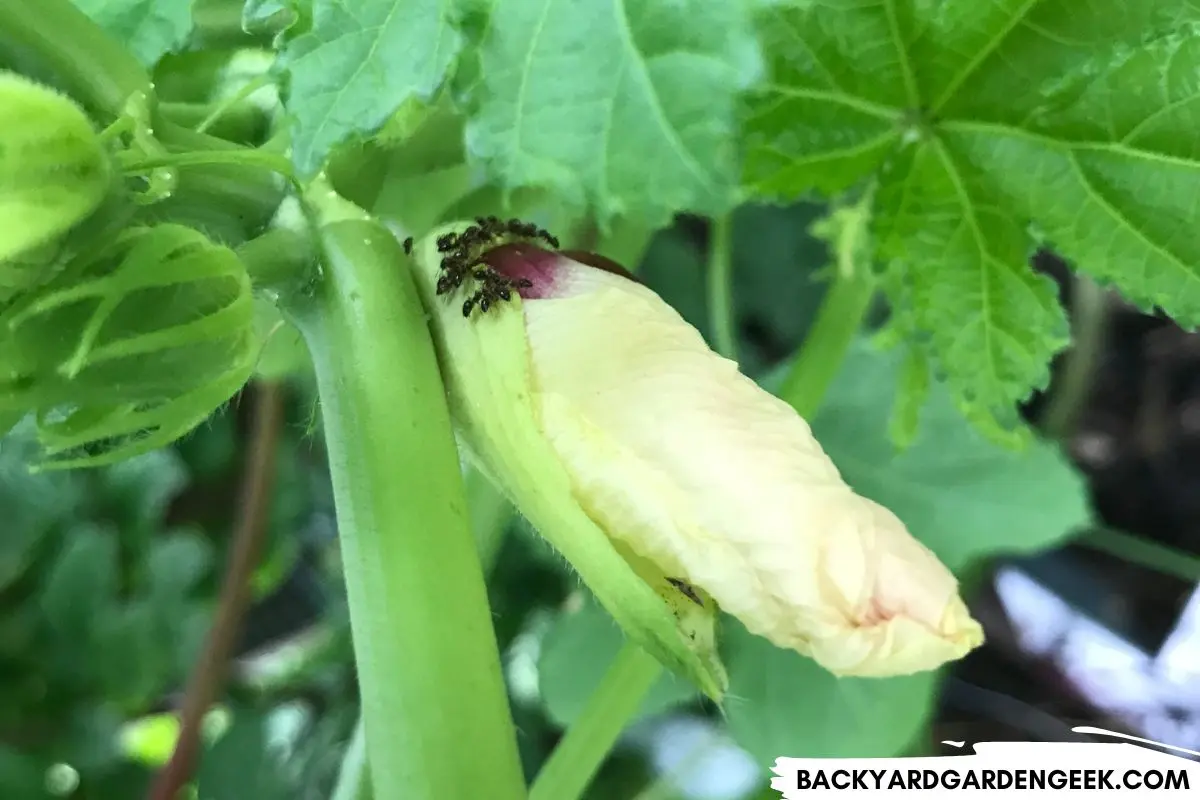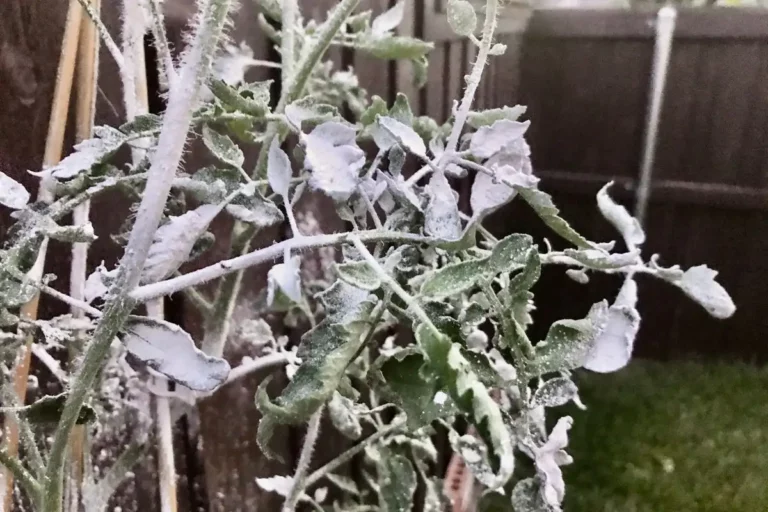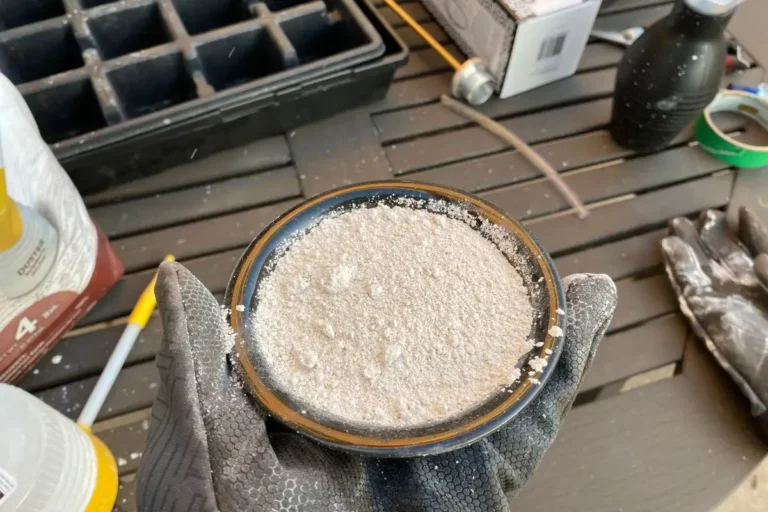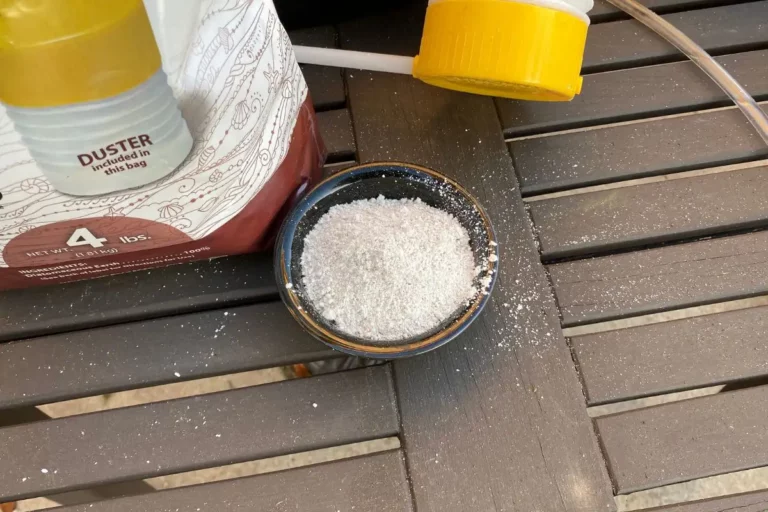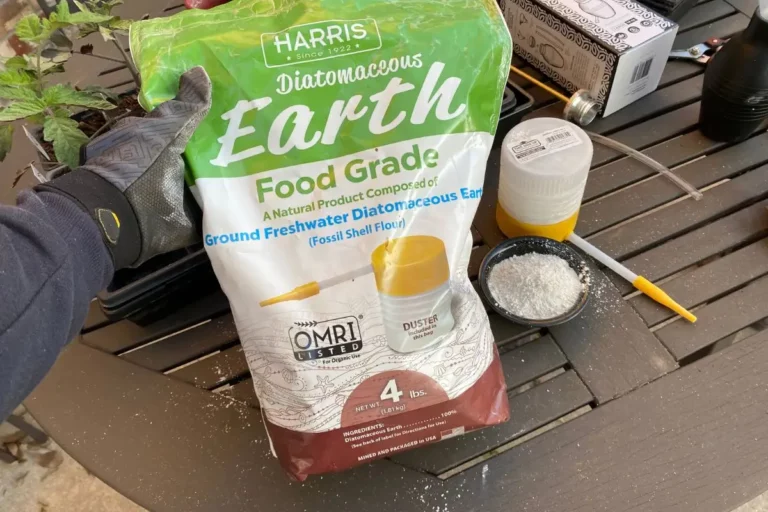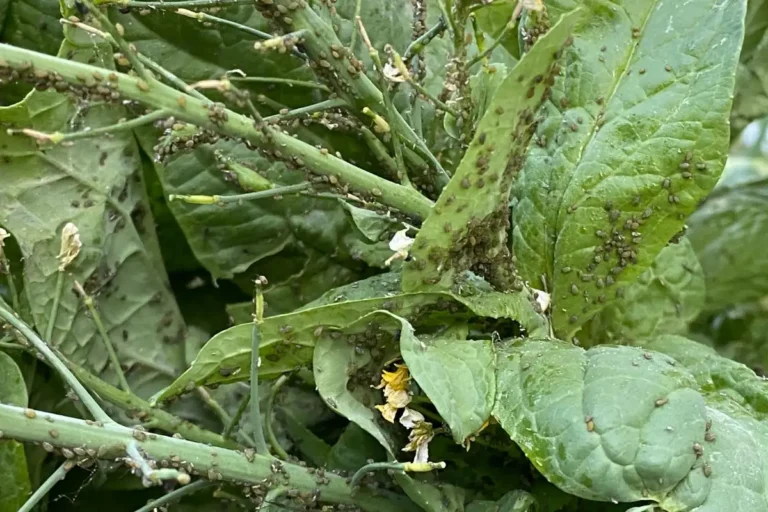7 Easy Ways to Get Rid of Ants on Your Okra Plants
Okra is one of my favorite things to grow in the garden. It’s easy to grow and relatively low maintenance, producing plenty of okra pods for me and my family.
However, I don’t like seeing ants traveling up and down the stalks or congregating at the base of my okra blossoms. If this has ever happened to you, it’s a real head-scratcher until you figure out what’s going on.
Ants can be a nuisance, so why are they on your okra plants, and what can you do about them?
To get rid of ants on okra plants, add 1/4 cup distilled white vinegar (59 ml) to a gallon of water and spray on the okra or sprinkle diatomaceous earth around the base of the plants. Borax baits, soapy water, peppermint essential oil, citrus sprays, and cucumber peels can also be used.
Disclosure: This post may contain affiliate links to some of my favorite products found on Amazon and other retail sites. I’ll earn a small commission from purchases made through those links, at no additional cost to you. Please read my product disclosure page to learn about the care I take when recommending products to my readers.
In this article, I’m going to answer 3 important questions:
- Why are ants on my okra plants?
- Will ants harm or kill my okra plants?
- How do I get rid of ants on my okra plants?
I’ll explain everything in detail below, but if you want to do what I do, you’ll probably want to pick up some of these products:
- Dr. Bronner’s Peppermint Castile Soap is a must-have for any backyard gardener.
- Medina orange oil is a great option for homemade ant repellants.
- Harris Diatomaceous Earth is great for getting rid of ant mounds nestled in your garden beds.
- Peppermint essential oil is another option for clearing ants from unwanted areas.
- You’ll need a good garden sprayer if you plan to apply soapy water or orange oil spray anywhere around your property.
Whether you regularly plant okra in your garden or are planting it for the first time, this article will provide the information you’ll need to successfully get rid of any ants you find on the plants and to keep your okra healthy and thriving throughout the growing season.
Why Are Ants on My Okra Plants?
Ants will visit okra plants for several reasons, so before you grow too concerned, you’ll want to identify exactly why those ants are crawling around your okra.
To do so, I’ll introduce you to the 5 primary reasons why you might see ants on your okra:
1. Aphids
If you see a trail of ants on your okra plants, chances are you’ve got aphids hiding somewhere on your plants.
Both are a problem, but here are some differences and similarities:
Members of the Aphididae family, aphids are small sap-suckers that’ll invade your garden, attach themselves to your plants using their tiny mouthparts, then siphon off the plant’s vital nutrients and leave behind sugary honeydew droplets, which end up attracting ants.
Unfortunately, they’ll end up spreading to other plants as well as coming back year after year if you don’t take care of your problem.
Aphids come in a whole variety of colors (black, green, orange, pink, red, white, and yellow), and the honeydew they leave behind can unfortunately encourage the growth of sooty mold since mold spores will stick to the honeydew droplets.
I’ve written about several effective ways to get rid of aphids on okra plants, so if you’re interested in learning more, check out that article!
2. Okra Pearl Bodies
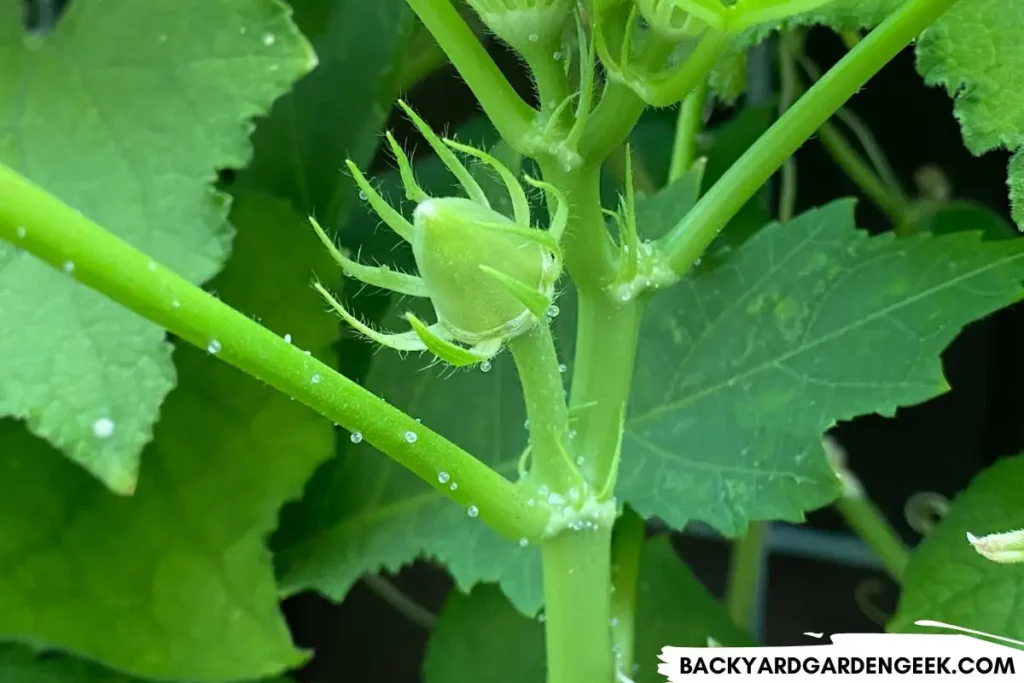
If you see what appears to be dewy secretions emanating from your okra plants, you might think there’s something wrong.
Don’t worry. There’s nothing wrong. Those are called pearl bodies. It’s a natural process that okra plants go through sometimes, and they cause no damage to the plants.
Pearl bodies are .5-2 mm wide. They’re glossy food bubbles produced by the okra plants, and they’re a rich food source for ants.
Okra plants will sometimes produce pearl bodies as a reward for ants in exchange for protecting okra from sap-sucking pests. Since aphids excrete honeydew as a food reward for ants, ants have the opportunity to choose which mutualistic relationship they want to maintain.
If they help the aphids, the okra plants suffer. If they help the okra plant, the aphids suffer. Ants will determine which food source they prefer, then do whatever they can to keep that food source producing.
A fascinating Frontiers in Plant Science study found that ants “preferred pearl bodies over aphid honeydew,” but I’ve also noticed that okra plants don’t regularly produce pearl bodies. Mine have only produced pearl bodies once during the past 3 growing seasons.
By choosing to feed on the pearl bodies instead of the honeydew, ants defend the okra plants from aphids and other plant-destroying bugs, providing a beneficial service to the plants.
3. Sharpshooters
Sharpshooters are pesky little bugs that are also known as leafhoppers. They feed on plant sap by piercing plant tissue, and although their sap-sucking isn’t really cause for concern, they can spread plant diseases.
Sharpshooters are easy to spot. They’re about 1/2 inch long and relatively skinny. They tend to shimmy sideways if you get near them. They also fly and hop around plants.
But the reason that ants like them is that, like aphids, sharpshooters leave behind sugary honeydew as they feed on okra. Ants will crawl all over your plants to get to this honeydew, so if you want to get rid of the ants, you’ve got to take care of the sharpshooters first.
4. Nesting Sites
Ants can build nests in the soil around your okra plants, which is why you might see them among your plants as the ants are seeking out sugary food sources.
Red fire ants can often be found in gardens, happily taking residence with their large colonies. But watch out because some black ant species are just as eager to join the party!
Seeking refuge under okra plants and easy access to food sources, they will gladly set up shop in or around your garden beds.
5. Okra Flower Blossoms
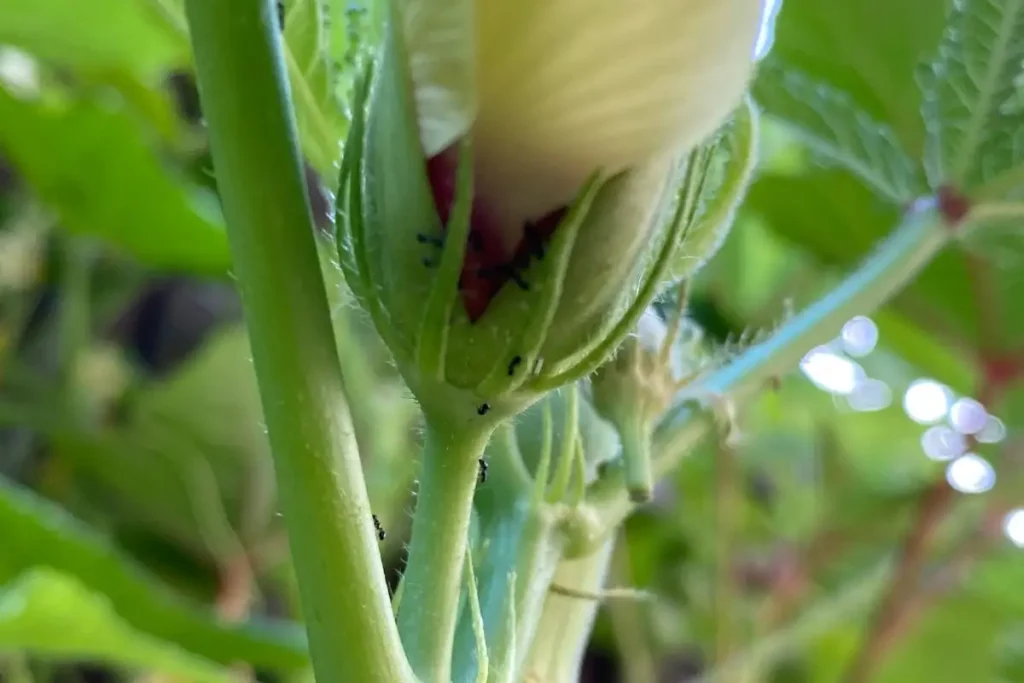
If you see ants bunched around your developing okra flowers, please note that they’re in that area because they’ve been attracted to the aromas and are feeding on the flower nectar.
When ants feed on the base of developing blooms before the buds have opened, they can cause the flowers to fall off before pollination occurs, reducing your overall okra yield.
If you keep reading below, you’ll see several strategies you can use to get rid of ants on okra plants, but I’ve written many other articles about ants in the garden, and you can check several of them out here:
- Ant Prevention with Essential Oils: Are They Safe for Cats?
- Ants on Your Bean Plants? Here’s How to Get Rid of Them
- Do Ants Hate the Smell of Peppermint? Here’s What to Know
- Will Neem Oil Kill or Repel Ants? All You Need to Know
Will Ants Harm or Kill My Okra Plants?
Gardeners have long known that ants will seek out honeydew droplets excreted by aphids, mealybugs, sharpshooters, and other sucking insects, but some ant species will feed on the base of developing blooms before the buds open, causing problems with pod development.
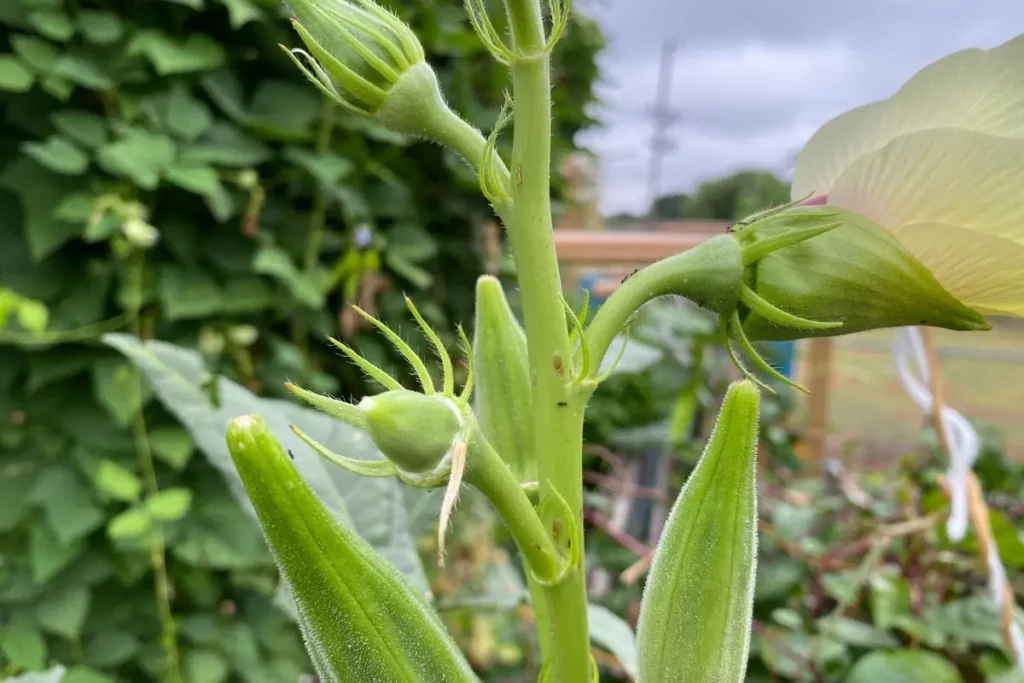
If red fire ants are present, you’ll need to locate the mounds and get rid of them to prevent the fire ants from visiting your garden.
For those who’ve heard that you can pour boiling water on ant mounds, please know that boiling water will only kill the ants near the mound and is not a long-term solution to controlling fire ant populations.
Also, don’t ever pour boiling water on ant mounds that are anywhere near your plants. In doing so, you might unwittingly damage your plants’ root systems by burning them with boiling water.
How Do You Get Rid of Ants on Okra Plants?
Fortunately for us gardeners, there are several natural, effective methods to get rid of ants in or around your okra plants, methods that don’t rely on harsh chemicals.
In this section, we’ll look at 7 safe methods to get rid of ants on your plants:
- Vinegar Solution
- Diatomaceous Earth Barrier
- Sticky Ant Traps
- Soapy water solution
- Peppermint Essential Oil Spray
- Petroleum Jelly Barrier
- Citrus and Cucumber Peel Repellent
We’ll explore these options one by one, so you can find a solution that works for you and keeps your okra plants ant-free and thriving.
1. Vinegar Solution
Distilled white vinegar is an effective ant deterrent since the acetic acid disrupts the ants’ ability to communicate and follow scent trails.
Here’s what you do to make this spray:
- In a large spray bottle, mix .25 cup (59 ml) of distilled white vinegar with 1 gallon of water.
- Add a few drops of dish soap to the mixture.
- Shake the bottle well to mix the solution.
- Spray the solution on all parts of the okra plants, paying extra attention to areas where you see ants.
- Repeat the application once a week to keep the ants away from your okra plants.
Depending on the severity of the ant infestation, you can adjust the strength of the vinegar solution. For light infestations, dilute the solution with more water. For severe infestations, use a stronger solution of equal parts distilled white vinegar and water.
Try this spray out on a single plant first to make sure it won’t damage anything once you spread it over the entire affected area.
2. Diatomaceous Earth Barrier
To create a barrier against ants using diatomaceous earth, follow these steps:
- When purchasing, make sure the diatomaceous earth is labeled “food-grade.” This means it’s safe for use in the garden and will not harm your okra plants or other beneficial insects. I prefer Harris Diatomaceous Earth.
- Sprinkle it around the base of your okra plants. Ensure you’ve created a continuous barrier, leaving no gaps for ants to crawl through.
- Reapply after rainfall or watering because diatomaceous earth loses its efficacy when wet.
This method controls ant populations on your okra plants since it keeps them away from the stalks of the plants.
But if you’ve got aphids or sharpshooters, you’ll need to either dust the plants directly with diatomaceous earth or use another method to kill them off first, like a soapy water spray or a neem oil spray. Otherwise, this will be a temporary stopgap.
3. Sticky Ant Traps
You can trap ants near the base of your okra plants using sticky ant traps. There are several options for sticky ant traps, including commercial products and DIY solutions.
The two that I’ve used are:
- Tanglefoot Insect Barrier: You can apply this sticky substance around the base of your okra plants to create a barrier that ants won’t cross. It’s long-lasting and can be purchased from big box stores, hardware stores, or online.
- DIY Sticky Traps: You can make sticky traps using household items like peanut butter, Karo syrup, honey, or borax.
To make the traps:
- In a small bowl, mix 1 tablespoon of peanut butter, Karo syrup, or honey with 1 teaspoon of borax.
- Spread the mixture on a small piece of cardboard or plastic.
- Place the trap near the base of your okra plants.
- Replace the trap periodically or when the sticky surface becomes too covered in ants to be effective.
The downside is that these sticky ant traps can attract both ants and beneficial bugs, so you might need to check them daily and stop using them if you notice they’re causing harm in your garden.
4. Soapy Water Solution
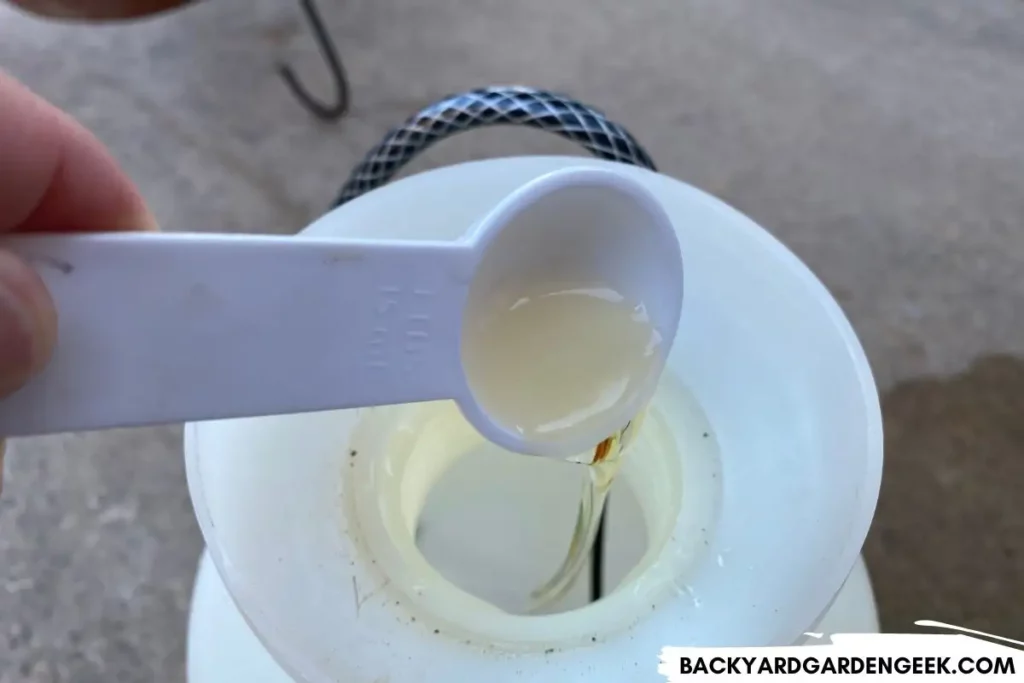
If you’ve got pesky ants, aphids, mealybugs, spider mites, whiteflies, or other garden pests hanging around your plants, soapy water is the best, most organic way to get rid of these pests.
Here’s how you make a soapy water solution that’ll knock out your bug problems in no time at all:
- Fill a 1- or 2-gallon spray bottle with water. I prefer to purchase a 2-gallon sprayer since I can store whatever I don’t use in my garage.
- Add 1-5 tablespoons (15-74 ml) of liquid soap to the water. I usually go with 4-5 tablespoons because I want to make sure my solution is strong.
- Shake the bottle well to mix the ingredients.
- Spray the solution wherever you see ants or other garden pests. Be sure to get the undersides of leaves because they commonly hide there.
- Repeat the process as needed. I usually do so every 1-3 days depending on how bad the infestation is. Just be sure to do so in the early evenings since that’ll decrease the chances that you’ll harm beneficial insects.
This soapy water solution is the most economical DIY method if you need to spray lots of plants or many days in a row. It’s also my all-time favorite method of getting rid of ants and other pests around the plants.
For bad infestations, I love using this soapy water spray in tandem with a once-a-week neem oil spray. If you’d like to learn more about my process, take a look at these articles:
- 11 Proven Ways to Stop, Kill, and Get Rid of Spider Mites
- Can You Use Too Much Neem Oil on Plants?
- Neem Oil Plant Burn: Why It Happens + How to Avoid It
- Using Neem Oil to Kill Spider Mites: A Complete Guide
5. Peppermint Essential Oil Spray
You can use peppermint essential oils to deter ants from accessing your okra plants. This natural remedy works by masking the pheromone trails ants use to communicate and navigate.
The only downside is the price since it’s more expensive to make this spray than to make soapy water sprays.
To make this spray:
- Fill a spray bottle with 2 cups (473 ml) of warm water.
- Add 10-20 drops of pure peppermint essential oil (not extract) to the water.
- Add 1 teaspoon of liquid soap, then shake the bottle well to mix the ingredients.
- Spray the solution on ant-infested areas, including the soil around the okra plants.
- Repeat the process as needed to maintain the efficacy of the peppermint oil.
Please note that peppermint extract is not as effective as the peppermint essential oil. Choose the oil, not the extract.
6. Orange Oil Spray
An effective deterrent that’s safe to use in the garden, Medina orange oil, when mixed with water and liquid soap, does a great job killing off and keeping ants away from your plants.
To implement this method:
- Fill a 1-gallon garden sprayer with water.
- Add 1.5 teaspoons of Medina orange oil (7.4 ml).
- Add 3 teaspoons of organic liquid soap (15 ml). I prefer Dr. Bronner’s Peppermint Castile Soap for all of my soapy water sprays.
- Spray your plants generously, getting the undersides of all leaves as well.
- Repeat the spray every 1-2 days until there are no more signs of ants or other garden pests.
This is basically a step up from my soapy water spray. The addition of orange oil gives ants 1 more reason to stay far away from your plants!
7. Cucumber Peel Repellent
Ants have an aversion to the scent of cucumber peels due to the presence of a chemical compound known as cucurbitacin. This compound releases a potent and bitter odor that ants find unpleasant.
If you’ve ever bitten into a homegrown cucumber and noticed that it tasted quite bitter, blame large amounts of cucurbitacin for that.
You can either place small pieces of cucumber peel near the base of the okra plants or make this recipe:
- Wash and peel a cucumber, reserving the peels.
- Boil the cucumber peels in a pot of water for 10-15 minutes.
- Allow the mixture to cool completely.
- Strain the mixture to remove the peels.
- Transfer the liquid to a spray bottle.
- Spray the liquid around areas where ants are present.
- Repeat the process after rain or watering.
Please note that ants will eat the cucumber’s flesh, which is why you can only use the peel.
The upside to this solution is that it’s basically free (assuming you’re eating cucumbers that day!). The downside to this solution is that it’s time-consuming to make compared to the soapy water spray I mentioned above.
Out of all of these methods, you can probably tell that I prefer the soapy water solution. It’s safe for your plants, cheap to make, easy to use, and handy to store.
For me, it’s an all-in-one solution to my garden pests problems, and if you mix it in a 2-gallon sprayer, you can usually spray your plants several times before you need to mix a new spray.
Will Ants Pollinate My Okra Plants?
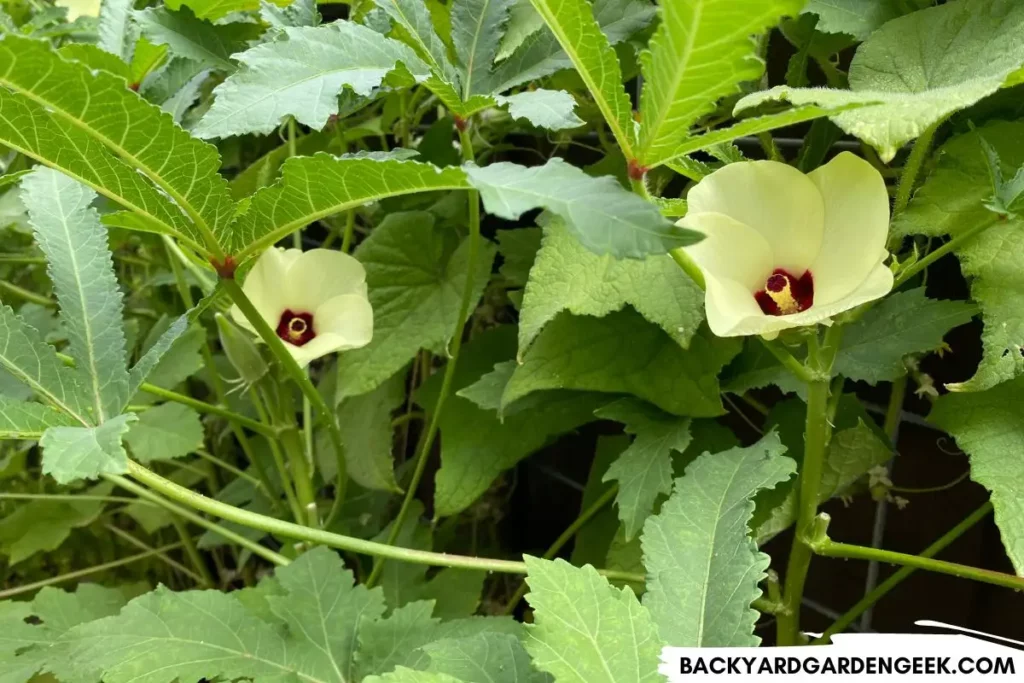
Okra are self-pollinating plants that don’t rely on insects for pollination, so no, ants will not help to pollinate your okra (sorry to be the bearer of bad news!).
Okra plants can naturally pollinate themselves with the help of wind or even gentle shaking.
If the weather conditions aren’t favorable for wind pollination, you can manually pollinate them. This simple process ensures that your okra plants will produce a good harvest even when weather conditions aren’t ideal.
I’ve never had to do this because the area where I live gets plenty of wind on an everyday basis, but I thought I’d mention it in case you’ve had pollination issues in the past.
Additional Information
If you’d like to learn more about ants and how to stop them from causing damage or headaches around your garden, check out these articles.
